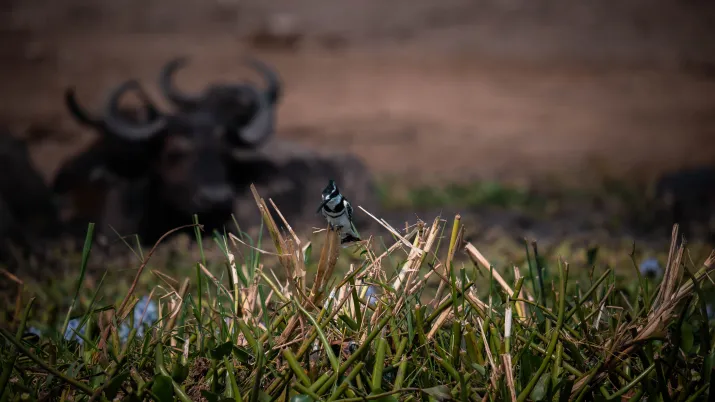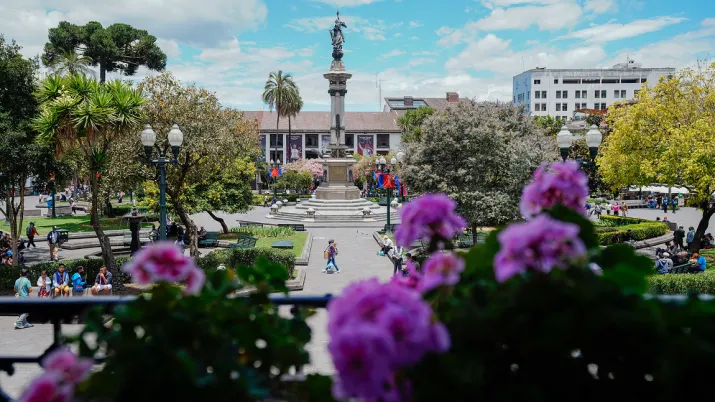 The degradation of nature can significantly impact a country's economic and social stability. Based on the case of South Africa, this study introduces a method to identify the economic sectors most vulnerable to risks stemming from biodiversity loss and assess their potential effects on various socio-economic indicators. Simultaneously, this method highlights sectors that present development opportunities due to a healthier biodiversity.
The degradation of nature can significantly impact a country's economic and social stability. Based on the case of South Africa, this study introduces a method to identify the economic sectors most vulnerable to risks stemming from biodiversity loss and assess their potential effects on various socio-economic indicators. Simultaneously, this method highlights sectors that present development opportunities due to a healthier biodiversity.
Context
Recent studies examining the risks to financial system stability associated with nature degradation have been conducted for countries such as the Netherlands, France, and others. These studies consistently underscore that biodiversity loss can have profound destabilising effects. Such effects may arise either from the collapse of ecosystems and the services they provide to economies (referred to as ‘physical shocks’) or from shifts in behaviour, technology, or regulation linked to ecological transitions (‘transition shocks’).
However, these risks extend well beyond the financial sector, particularly in countries from the Global South. How can the macro-financial context be better incorporated into analyses of nature-related risks in emerging economies, where it plays a critical role in the resilience of businesses and institutions? And in the context of climate challenges, how can we better account for the territorial dimension of nature-related risks and conduct spatially explicit assessments?
Objectives
Focusing on the case of South Africa, this study evaluates the potential effects of either a physical shock (resulting from the degradation of ecosystem services) or a transition shock (arising from measures or innovations aimed at reducing the pressures certain economic sectors place on biodiversity). These effects will be examined across multiple dimensions, including production, income generation, inflation, employment, wages, external balance, and fiscal stability.
Beyond this broad analysis, the method seeks to identify the specific locations of these risks within the region. This spatially explicit approach aims to provide actionable insights for local decision-makers, enabling them to implement well-informed measures for an effective ecological transition.
Method
This study introduces innovative methods for assessing the socio-economic risks associated with nature degradation, grounded in two main contributions:
- Multidimensional analysis of macro-financial and social variables: the study examines the exposure of key macro-financial and social variables to nature-related risks. By using input-output tables extended to include environmental and socio-economic satellite accounts, it identifies how these risks could significantly affect sectors that are directly and indirectly critical to production chains and, consequently, socio-economic stability.
- Granular spatial assessment: at the municipal level in South Africa, the study investigates nature-related vulnerabilities through a more detailed spatial analysis. This approach integrates spatially disaggregated economic data with mapped ecological data to ensure consistency, enabling the identification of specific socio-economic exposures.
Together, these two interconnected approaches emphasize the need for a holistic understanding of nature-related risks. They demonstrate the value of interdisciplinary collaboration between economists and ecologists, aiming to balance the intertwined goals of economic prosperity, social stability, and environmental sustainability.
Research findings
The study identifies economic sectors potentially exposed to significant risks and provides South African stakeholders with a foundation for conducting deeper analyses to determine the extent and materiality of these risks.
In South Africa, for instance, 80% of the country’s exports and 60% of business loans are heavily reliant on the water supply services provided by ecosystems. Beyond direct exposure, shocks affecting sectors dependent on these ecosystem services can cascade through the industrial network, triggering demand or supply disruptions. While 18% of jobs and 24% of salaries are directly exposed to such risks—particularly in the property and manufacturing sectors—these figures rise to 48% and 56%, respectively, when considering activities indirectly linked through value chains.
Given biodiversity’s strong dependence on geographic factors, it is essential to complement prior analyses with geolocalised studies. These analyses identify the economic activities located in areas where ecosystems and their services are already degraded. For example, when factoring in the location of companies involved in exports, the initial estimate that 80% of South African exports depend on surface water supply decreases to around 23%. This revised figure reflects exports generated by activities reliant on surface water supply and situated in municipalities where this ecosystem service is significantly degraded. In other words, when the geographic degradation of ecosystem services is considered, nearly a quarter of net exports are directly vulnerable to water scarcity.
Find out more:
- Read the research paper: Socio-economic and spatially-explicit assessment of nature-related risks – The case of South Africa
- Read the research paper: A framework to assess socioeconomic and spatialized nature-related risks: An application to South Africa (Environmental and Sustainability Indicators, 2025)
- Watch the replay of the Research Conversations webinar on the research project, with South African partners
Key outcomes
The method has garnered interest and validation from numerous economic and environmental policymakers, highlighting its relevance. Rather than focusing on precise numerical results, the emphasis lies on the orders of magnitude and the identification of economic sectors that are either highly dependent on ecosystem services (exposed to physical risks) or exert significant pressure on biodiversity (exposed to transition risks). These insights are sparking interest and debate.
One of the key outcomes has been fostering dialogue among South African stakeholders who previously had limited interaction, including the South African National Biodiversity Institute (SANBI), the Department of the Environment, the Department of Finance, and the South African Reserve Bank (SARB).
South African stakeholders are now working to translate these technical findings into accessible materials for non-specialist audiences and to facilitate deeper discussions with representatives from sectors identified as either risk-exposed or offering opportunities for resilience and positive socio-economic impacts.
Furthermore, the South African Reserve Bank, in collaboration with the Agence Française de Développement (AFD), is applying this method to assess the financial sector's exposure to nature-related risks across member countries of the Southern African Development Community (SADC). The Development Bank of South Africa (DBSA) has also begun using this approach to evaluate the exposure of its own portfolio. Future iterations and enhancements of the method are anticipated as its use expands.
Contacts
- Paul Hadji-Lazaro, Ecological Macroeconomist at AFD
- Julien Calas, Research Officer on Biodiversity, AFD
- Antoine Godin, Economist, Head of AFD Macroeconomic Modelling Unit
- Andrew Skowno, National Biodiversity Analysis Coordinator at SANBI
- Pamela Sekese, Geospatial Consultant
Stay up to date with our latest research news
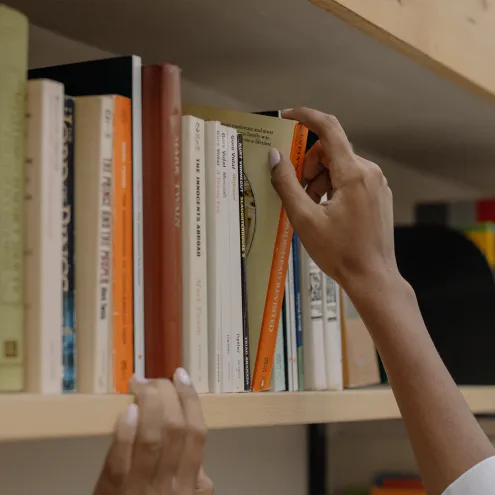
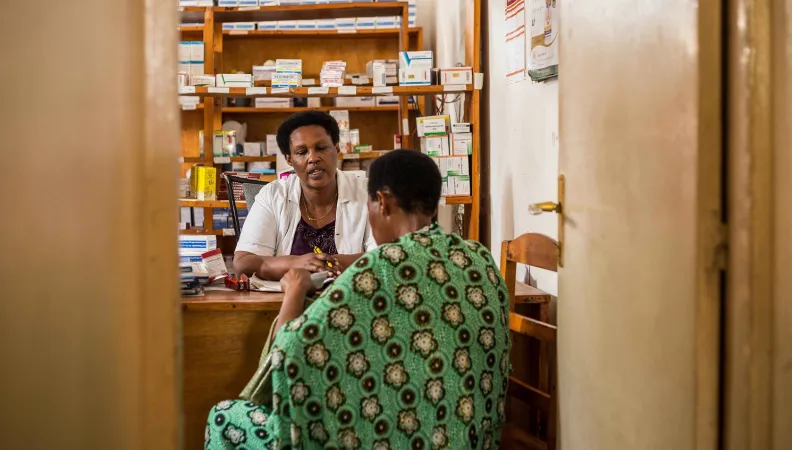 Africa remains a young continent. However, the ongoing demographic transitions are accompanied by an anticipated aging population — and in some countries, this process has already begun. Although a wide variety of situations coexist across the continent, the growing number of older people will require significant adjustments to public policies, including fiscal, health, and social measures.
Africa remains a young continent. However, the ongoing demographic transitions are accompanied by an anticipated aging population — and in some countries, this process has already begun. Although a wide variety of situations coexist across the continent, the growing number of older people will require significant adjustments to public policies, including fiscal, health, and social measures.
Context
In many African countries, older people still represent a very small share of the population (3% in sub-Saharan Africa and 5.6% in North African countries). For a long time, they have been largely overlooked by public policies, which have focused instead on the most urgent needs of economic, social, and health development — primarily targeting children and young adults.
However, the number of older people is increasing — not only in absolute terms but soon also in relative terms, with aging projected to occur more rapidly than in other regions. The challenge now is to design and implement appropriate public policies to support this demographic shift, particularly in the areas of health and social protection.
New forms of coverage and protection are emerging — or becoming essential — such as cash transfers, which complement family-based solidarity systems, free healthcare and services for older adults, the expansion of so-called universal pension and retirement schemes, and more broadly, private support systems on which most older people on the continent must still rely.
Objectives
This research project provides a framework for understanding population aging and related public policies across the African continent, from a comparative perspective. It examines the aging process, its associated challenges, the public policies addressing it, and the institutional frameworks in various countries, focusing on emblematic case studies that reflect diverse situations (South Africa, Cameroon, Cape Verde, Kenya, Morocco, and Senegal). The project also includes targeted analyses based on recent data, highlighting the contributions of demographic research to issues of health and social protection (notably pensions) for older adults.
The project resulted in a valuable overview for policymakers in AFD’s partner countries, contributing to broader reflections on the conditions under which different public policy models may or may not be replicated across the African continent.
Method
The project is based on a comparative analysis of secondary demographic data drawn from existing sources — including research papers, reports, and scientific literature. By presenting the different trajectories of demographic transitions, it offers an overview of aging across the continent, including its timing and context, and explores the associated challenges for both national and local public policies. It highlights regional, national, and subnational variations in aging, in order to identify the areas that are either most advanced in this process or experiencing the fastest pace of change.
Focused case studies on a selection of countries representing different situations provide a systematic critical review along the following lines:
- a socio-demographic and health overview;
- a description of the institutional framework and public policies in place;
- a critical analysis of the social and health-related challenges of the aging process;
- and an exploration of how aging is transforming family structures — particularly regarding intergenerational transfers, migration patterns, and women’s labor participation.
Results
The research project led to the following publications:
- The publication of the research paper “Africa Facing Its Aging Population: What Are the Challenges for Public Policy?” (in French, June 2024);
- The release of “How can healthcare for older people in sub-Saharan Africa be improved?” (April 2024);
- The publication of “Health Statistics on Older Adults in Sub-Saharan Africa: A Literature Review” (in French).
In July 2023, a webinar from the Research Conversations series presented the project’s initial findings (in French only):
Research findings
Africa is expected to face the challenge of an aging population in the coming decades. The first and foremost challenge lies in expanding social protection coverage, which is currently the lowest in the world: only 17% of the population is covered. This low rate is partly due to the predominance of the informal economy, which hinders the development of a contributory social protection system — particularly in rural areas. There is now a pressing need to strengthen public policies aimed at expanding social protection to a broader share of the population, both in rural and urban areas.
However, the evolution of social protection systems — particularly in health and pensions — rests on several key pillars that remain uncertain and have historically been prerequisites for their expansion:
- First, the effective collection and use of tax revenues to finance social protection;
- Second, the promotion of stronger links between pension and health coverage;
- And finally, sustained economic growth driven by a development model — historically industrial and manufacturing-based — that enabled the establishment of such public policies.
Yet in Africa, this economic model, centered on formal employment, has not taken root. Moreover, the impacts of climate change are raising fundamental questions about this development path, making it even more difficult to design and implement aging-related public policies — just as they are becoming increasingly necessary.
READ OUR RESEARCHER'S INTERVIEW
Serge Rabier: ‘Many African Countries Have No Social Protection Programmes For Elderly’
Want to stay updated on AFD’s latest research?
Contact
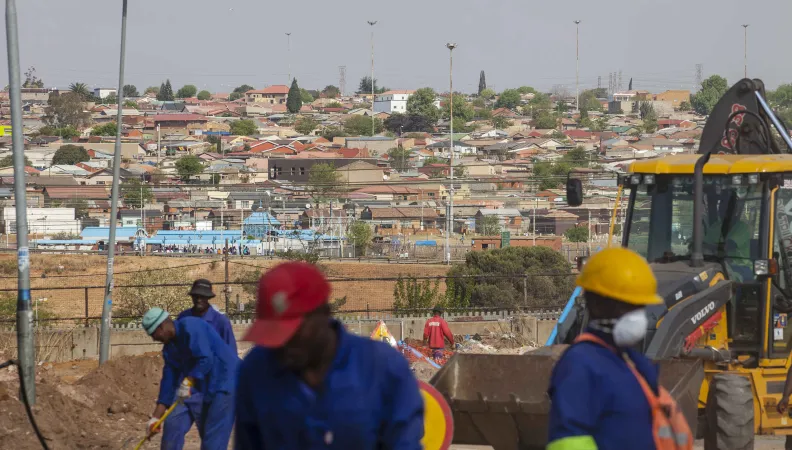 Legal notice EU (project) How could the Social Relief Distress grant be redesigned to maximize impact on poverty and unemployment reduction, while being sustainable in the longer term? The Extension of the EU-AFD Research Facility on Inequalities will seek to answer this question in partnership with SALDRU (University of Cape Town – Southern Africa Labour and Development Research Unit).
Legal notice EU (project) How could the Social Relief Distress grant be redesigned to maximize impact on poverty and unemployment reduction, while being sustainable in the longer term? The Extension of the EU-AFD Research Facility on Inequalities will seek to answer this question in partnership with SALDRU (University of Cape Town – Southern Africa Labour and Development Research Unit).
Context
South Africa’s Economic Reconstruction and Recovery Plan was launched in October 2020 by the Presidency in response to the economic impacts of the Covid-19 pandemic. Besides the Presidential Employment Stimulus program, it included emergency social protection measures, among which the introduction of a special Covid-19 Social Relief of Distress grant (SRD), providing ZAR350 per month for unemployed people not covered by any other form of support. The South African government now seeks to develop options for the future of SRD grant.
This project is part of the Extension of the EU-AFD Research Facility on Inequalities. Coordinated by AFD and financed by the European Commission, the Extension of the Facility will contribute to the development of public policies aimed at reducing inequalities in four countries: South Africa, Mexico, Colombia and Indonesia over the period 2021-2025.
Objectives
The objective of this research project is to produce motivated recommendations on how the SRD should be designed going forward into the longer term, in order to maximize the impact of the grant on employment outcomes and to ensure it effectively reduces poverty, while maintaining its cost to an acceptable level:
- To maximise the impact of the grant on employment, the project needs to understand how to design and label the grant to encourage its use for job search.
- To ensure the grant effectively reduces poverty, the project must figure out the most cost-effective way to target and assess the eligibility of recipients. Moreover, poverty reductions can be scaled up by determining measures that could encourage take up among the most disadvantaged.
Once these goals have been achieved, and in order to inform public decision-making, these findings must be communicated to a number of stakeholders in government and civil society.
This project is part of a wider research program conducted with several South African research centres and in close collaboration with the South African Presidency. Four other research projects analysing the externalities of the Covid-19 stimulus policy are currently being developed as part of the first pillar of the Extension's activities in South Africa.
Method
This research project uses the model generated to conduct the 2014/2015 fiscal incidence assessment and introduces updated data for 2019-2021. It simulates five scenarios around eligibility criteria, targeting mechanisms, value, disbursement model and conditionalities and computes the potential impact on poverty and employment outcomes.
Publications
You will find below the research paper related to this project:
Contact
- Anda David, AFD Research Officer
 As part of the ECOPRONAT research programme, AFD is working with the Indian Institute for Human Settlements (IIHS) to analyse the links between urban agriculture, nature-based solutions (NBS) and city-scale resilience in Bangalore. Documenting the role of urban food systems in the production of ecosystem services aims at contributing to the development of sustainable urban development policies.
As part of the ECOPRONAT research programme, AFD is working with the Indian Institute for Human Settlements (IIHS) to analyse the links between urban agriculture, nature-based solutions (NBS) and city-scale resilience in Bangalore. Documenting the role of urban food systems in the production of ecosystem services aims at contributing to the development of sustainable urban development policies.
Context
As the field of research on green infrastructure and nature-based solutions in cities expands, the potential of urban agriculture in the production of ecosystem services remains unexplored. Beyond the benefits of increasing food supply and reducing the vulnerability of urban populations, urban food systems can be at the heart of policies to develop nature-based solutions. This project studies the potential benefits of these systems in the perimeter of Bengaluru, an Indian city with a strong heritage in terms of urban agriculture.
This project is part of the ECOPRONAT research programme, which supports research on how to better take into account biodiversity and mainstream it into key economic sectors.
Objectives
Taking the case study of Bengaluru, this project led by IIHS explores how and why urban food systems, in rapidly developing urban and peri-urban areas, can be seen as nature-based urban solutions that bring benefits to ecosystems and society.
Two research questions are addressed:
- What is the scope and outcomes of urban agriculture for ecosystem services (including pollination) and societal well-being (such as food and nutritional security of the most vulnerable populations)?
- How can we use different co-production pathways across the science-policy-citizen interface to scale up NBS around sustainable urban agricultural practices?
Method
The research methodology is based on three main work packages:
- Synthesis of scientific knowledge on the potential of NBS and existing practices at various scales, and particularly within a chosen ward of Bengaluru with the deployment of pilot interventions;
- Incubation and capacity building: incubating novel NBS ideas and experiments related to pollinator friendly and water conserving urban agriculture, and capacity building through the training of various stakeholder groups;
- Scaling impact by identifying and engaging with different stakeholders, including city-level policy and decision makers, right from the start of the project to ensure the scaling of impact throughout the project.
Results
The expected results of these projects are:
- Academic results on sustainable urban food systems in the context of rapidly urbanizing countries from the Global South, on urban NBS experiences and their effects on ecosystem services (including pollination);
- Knowledge outputs for urban decision-makers on the integration of NBS in urban planning;
- Capacity building and teaching materials on multidisciplinary approaches to urban sustainability.
The project is also testing nature-based solutions aimed at strengthening the resilience of food systems in Bangalore.
An example: the PLUME project
Supported by the IIHS, the PLUME (Pollinator Linked Urban Multifunctional Ecosystems) project is developing pollinator-friendly food gardens in private and public spaces, installing infrastructure such as bee hotels, and raising public awareness of the importance of biodiversity for urban agriculture. The project team has designed a ‘PLUME toolkit’ containing seeds of local species and the appropriate equipment for sowing them, as well as educational tools and a website.
By testing nature-based solutions, PLUME is the action research component of the research carried out by the IIHS on the greening of urban food systems as part of the Ecopronat research programme. It demonstrates how sustainable agricultural practices can be integrated into cities while enhancing biodiversity and citizen involvement through a research-action approach.
Research findings
The research team aims to show how nature-based solutions (NbS) can address urban water security challenges in the Global South — a topic that remains underexplored in the scientific literature, which is still largely focused on the Global North. Drawing on expert discussions and a literature review, they identify the specific characteristics of these contexts (environmental, socio-economic, governance-related, technical capacity, etc.), as well as the barriers and opportunities for implementing these solutions. The goal is to propose concrete avenues to support the more effective and equitable adoption of NbS in cities of the Global South.
Read the research paper
Other projects on Nature-based Solutions supported by ECOPRONAT
